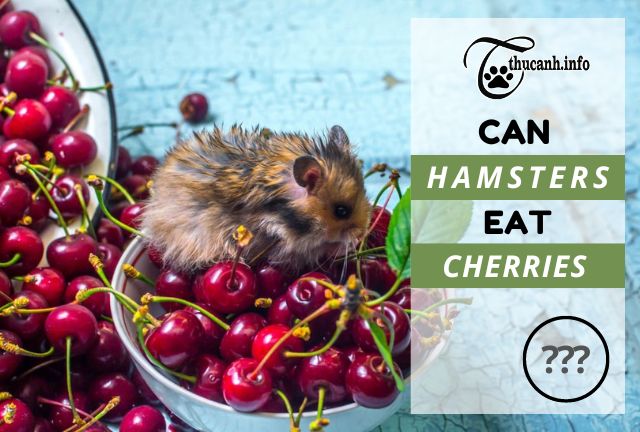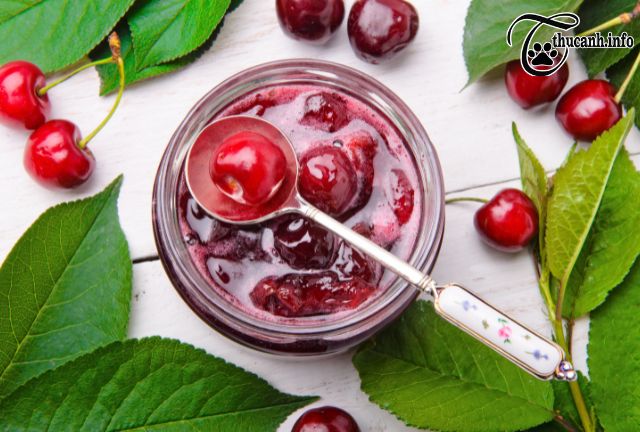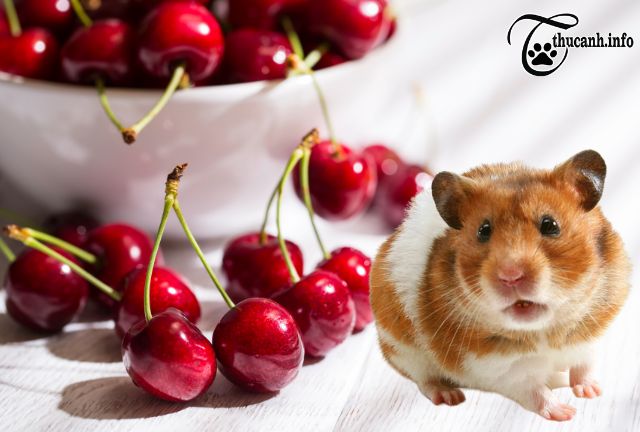Can Hamsters Eat Cherries? Unveiling the Truth and Safe Alternatives for Your Furry Friends. Have you ever wondered if cherries are safe for your beloved hamsters? This comprehensive guide explores the ins and outs of including cherries in a hamster’s diet. We’ll discuss potential risks, nutritional benefits, and provide you with a list of safe alternatives to keep your furry friends happy and healthy. Read on to make informed decisions about your hamster’s diet and well-being!
1. Can Hamsters Eat Cherries?
YES, hamsters can eat cherries, but with certain precautions. Cherries contain essential vitamins and minerals that can benefit your hamster’s health. They are a good source of vitamin C, fiber, and antioxidants. However, it’s crucial to remember that moderation is key when introducing any new food to your hamster’s diet.

Hamster Treats: 5 Cherries Substitutes
2. Nutritional Benefits of Cherries for Hamsters
Cherries offer several health benefits for your hamster when fed in appropriate quantities. Here are some of the key nutritional benefits they provide:
2.1 Vitamin C Boost
Cherries are rich in vitamin C, an essential nutrient that supports a healthy immune system. Including cherries in your hamster’s diet can help prevent illnesses and keep them in good overall health.
2.2 Fiber for Digestion
Fiber plays a vital role in maintaining proper digestion for hamsters. Cherries contain dietary fiber, which aids in regulating their bowel movements and preventing digestive issues such as constipation.
2.3 Antioxidant Power
Cherries are packed with antioxidants that help protect your hamster’s cells from damage caused by harmful free radicals. These antioxidants contribute to overall well-being and can potentially reduce the risk of certain diseases.
3. Potential Risks and Precautions

Cherries & Hamsters: 5 Important Facts
While cherries offer nutritional benefits, there are still some risks associated with feeding them to your hamster. It’s crucial to take necessary precautions to ensure your furry friend’s safety.
3.1 Choking Hazard
Cherries have pits that can pose a choking hazard for hamsters. Before offering cherries to your pet, make sure to remove the pits entirely. Accidental ingestion of cherry pits can lead to choking or intestinal blockages, which may require immediate veterinary assistance.
3.2 High Sugar Content
Cherries are naturally sweet due to their sugar content. Hamsters have a low tolerance for sugar, and excessive consumption can lead to health issues like diabetes and obesity. It is important to serve cherries in moderation and as an occasional treat.
3.3 Allergic Reactions
Just like humans, hamsters can have allergies too. While rare, some hamsters may be allergic to cherries. Pay close attention to any signs of allergic reactions such as diarrhea, skin rashes, or difficulty breathing after feeding cherries. If you notice any adverse reactions, consult your veterinarian right away.
4. How to Safely Incorporate Cherries into Your Hamster’s Diet

Cherries in a Hamster’s Diet: Guidelines
If you decide to introduce cherries into your hamster’s diet, here are some guidelines to follow for their safety:
- Remove the Pits: Always remove the pits before serving cherries to your hamster. Make sure there are no small pieces left that could pose a choking hazard.
- Offer Small Portions: Start by offering a small piece of cherry and observe your hamster’s reaction. If they show no adverse effects, you can gradually increase the portion size, but still maintain moderation.
- Wash Thoroughly: Rinse the cherries thoroughly before feeding them to your hamster to remove any pesticides or dirt residues that may be present.
- Variety is Key: Cherries should only be a part of your hamster’s overall diet. Ensure they have a balanced meal consisting of pellets, fresh vegetables, and occasional fruits.
5. Safe Alternatives for Hamster Treats
Taking care of your hamster’s dietary needs is vital for their overall health and well-being. If you’re considering treats for your furry friend, it’s essential to choose safe alternatives to cherries. Here are some nutritious options to keep your hamster both satisfied and healthy:
5.1 Fresh Vegetables and Fruits
Fresh vegetables are an excellent addition to your hamster’s diet. Carrots, cucumbers, and bell peppers are rich in essential vitamins and minerals that support their immune system and overall health. Incorporating these vegetables into their diet provides variety and promotes proper digestion.
Furthermore, offering fruits like apples and blueberries can be a delightful treat for your hamster. These fruits offer natural sweetness and essential nutrients without the potential risks associated with cherries. However, always ensure to serve fruits in moderation, as they contain natural sugars that should be consumed in controlled portions.
5.2 Commercial Hamster Treats
When choosing commercial treats for your hamster, opt for products specifically formulated for their dietary needs. These hamster treats undergo rigorous testing to ensure they meet the nutritional requirements of your furry companion. Look for treats made from hamster-friendly ingredients, avoiding any harmful additives or excessive sugar content.
By selecting safe alternatives to cherries, you prioritize your hamster’s well-being and prevent any potential health issues. Remember to maintain a balanced diet for your pet and consult with a veterinarian if you have any concerns about their nutritional intake. Your hamster will thrive with a carefully curated diet and a variety of safe and nutritious treats.
5.3 Nutritious Seeds and Grains – Including Sunflower Seeds and Oats
Sunflower seeds and oats are excellent alternatives to cherries for hamsters. These seeds and grains are rich in essential nutrients like protein, fiber, and healthy fats, promoting overall well-being. They can be offered as occasional treats or included in their regular diet in small portions. Remember to choose unsalted and unflavored options to avoid any potential health risks.
5.4 Insect Protein – Offering Mealworms and Crickets as Treats
Insect protein, such as mealworms and crickets, can be a valuable addition to your hamster’s diet. These small treats are high in protein and mimic the natural diet of hamsters in the wild. Providing insect treats in moderation can contribute to their dietary variety and provide essential nutrients.
5.5 Cooked Eggs – A Protein-Rich and Safe Treat Option
Cooked eggs are a safe and protein-rich treat option for hamsters. Eggs offer essential amino acids, vitamins, and minerals, supporting their overall health. Make sure to cook the eggs thoroughly and serve them in small, bite-sized pieces to prevent overfeeding.

5 Safe Alternatives: Hamsters and Cherries
5.6 Small Portions of Cooked Meat – Providing Lean Proteins for Variety
Offering small portions of cooked lean meats, such as chicken or turkey, can add variety to your hamster’s diet. Meat provides valuable lean proteins, but it should only be given occasionally and in small amounts to avoid digestive issues.
5.7 Rice Cakes – A Low-Calorie and Crunchy Snack
Rice cakes can serve as a low-calorie and crunchy snack for hamsters. Opt for plain, unsalted rice cakes without any artificial flavorings. They can be given as occasional treats to satisfy your hamster’s need for chewing and nibbling.
5.8 Dried Fruits – Offering Dried Apples and Bananas as Occasional Treats
Dried apples and bananas can be offered as occasional treats, providing natural sweetness and nutritional benefits. However, it’s essential to limit their intake due to their concentrated sugar content. Always choose unsweetened and preservative-free dried fruits.
5.9 Unsalted Nuts – Providing Healthy Fats in Moderation
Unsalted nuts, such as almonds and walnuts, can be offered in moderation as a source of healthy fats for your hamster. Nuts should be served in small portions due to their high-fat content. Ensure they are raw and unsalted to avoid any harmful additives.
6. FAQs about Hamsters Eating Cherries
6.1 Can all types of hamsters eat cherries?
Yes, cherries are generally safe for all hamster breeds. However, individual hamsters may have different dietary needs, so it’s always best to consult with your veterinarian before introducing new foods.
6.2 How often can I feed cherries to my hamster?
Cherries should be given as an occasional treat, once or twice a week at most. Remember to keep the portions small to avoid any potential health issues.
7. Conclude
In summary, the article on thucanh.info has answered you “Can hamsters eat cherries?”. Although cherries may seem appealing, it is best to avoid feeding your hamster because of the risks.” potential. Eat hamster-friendly foods such as fresh vegetables, fruits, seeds and insects to ensure their safety and overall health. Always prioritize a balanced diet and consult with them. Consult your vet for a private consultation. Your furry friends will thrive on a carefully curated menu, leading to a happy and healthy life. Remember, a A well-informed hamster owner is a happy hamster owner!


